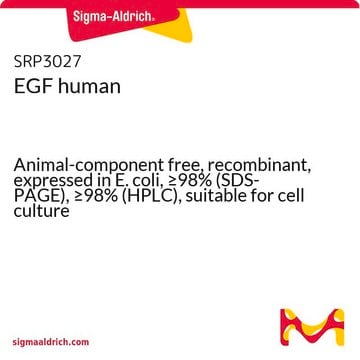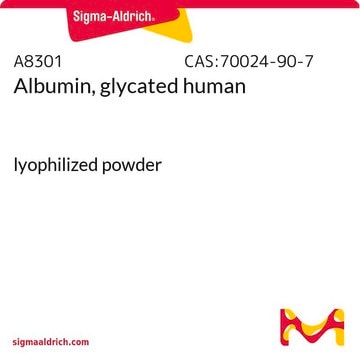SCP0152
Gastrin I (1-14)
≥92% (HPLC)
Iniciar sesiónpara Ver la Fijación de precios por contrato y de la organización
About This Item
Fórmula empírica (notación de Hill):
C79H100N16O27
Peso molecular:
1705.73
UNSPSC Code:
51111800
NACRES:
NA.32
Productos recomendados
assay
≥92% (HPLC)
form
lyophilized
composition
Peptide Content, ≥75%
storage condition
protect from light
storage temp.
−20°C
Amino Acid Sequence
Glp-Gly-Pro-Trp-Leu-Glu-Glu-Glu-Glu-Glu-Ala-Tyr-Gly-Trp
General description
Gastrin, a classic digestive hormone, is found in three major forms: gastrin-34 (big gastrin), gastrin-17 (little gastrin), and gastrin-13 (minigastrin). Mammalian gastrin consists of a C-terminal four amino-acid sequence and a sulfated tyrosine 7 residue from the C-terminus. Gastrin is mostly found in the G cells of the stomach mucosa. Nutrients and gastrin-releasing peptides stimulate the release of gastrin.
Application
Gastrin I (1-14) has been used:
- as a component of gastric cancer stem/progenitor cell (GCSPC) medium for tumorsphere culture
- as a supplement in organoid growth medium (OGM) for patient-derived organoid (PDO)
- in viable lymphocytes culture for re-stimulation assay
Biochem/physiol Actions
Gastrin is a linear polypeptide that induces the secretion of gastric acid (HCl) by parietal cells.
The peptide gastrin I (1-14), which lacks a basic site, forms positive ions. Gastrin promotes the production and liberation of histamine in enterochromaffin-like cells through cholecystokinin 2 receptor (CCK2R). It also stimulates the release of gastric acid in parietal cells via the CCK2R receptor. Gastrin plays a key role in Zollinger-Ellison syndrome. It may play a role in the development of colorectal carcinoma.
Storage Class
11 - Combustible Solids
wgk_germany
WGK 3
flash_point_f
Not applicable
flash_point_c
Not applicable
Certificados de análisis (COA)
Busque Certificados de análisis (COA) introduciendo el número de lote del producto. Los números de lote se encuentran en la etiqueta del producto después de las palabras «Lot» o «Batch»
¿Ya tiene este producto?
Encuentre la documentación para los productos que ha comprado recientemente en la Biblioteca de documentos.
Los clientes también vieron
C M Thorburn et al.
Gastroenterology, 115(2), 275-280 (1998-07-25)
Gastrin is a putative promoter of colorectal carcinomas. The aim of this study was to evaluate the temporal relationship between gastrinemia and development of colorectal malignancy. We conducted a nested case-control study among 128,992 subscribers to a health maintenance program
Gastrin
Handbook of Hormones (2016)
Zhi-Feng Miao et al.
Stem cells (Dayton, Ohio), 32(12), 3062-3074 (2014-08-22)
Peritoneal dissemination is the most common cause of death in gastric cancer patients. The hypoxic microenvironment plays a major role in controlling the tumor stem cell phenotype and is associated with patients' prognosis through hypoxia-inducible factor-1α (HIF-1α), a key transcriptional
Junjie Gao et al.
Rapid communications in mass spectrometry : RCM, 22(24), 4066-4072 (2008-11-21)
Negative ion production from peptides and proteins was investigated by matrix-assisted laser desorption/ionization time-of-flight (MALDI-TOF) mass spectrometry. Although most research on peptide and protein identification with ionization by MALDI has involved the detection of positive ions, for some acidic peptides
F L Lai Benjamin et al.
Advanced functional materials, 30(48) (2021-03-12)
Tumor progression relies heavily on the interaction between the neoplastic epithelial cells and their surrounding stromal partners. This cell cross-talk affects stromal development, and ultimately the heterogeneity impacts drug efflux and efficacy. To mimic this evolving paradigm, we have micro-engineered
Nuestro equipo de científicos tiene experiencia en todas las áreas de investigación: Ciencias de la vida, Ciencia de los materiales, Síntesis química, Cromatografía, Analítica y muchas otras.
Póngase en contacto con el Servicio técnico
![[Leu15]-Gastrin I human ≥95% (HPLC)](/deepweb/assets/sigmaaldrich/product/structures/153/342/d4cb3dd7-13f1-46cf-8d1f-3907a5de7a83/640/d4cb3dd7-13f1-46cf-8d1f-3907a5de7a83.png)












